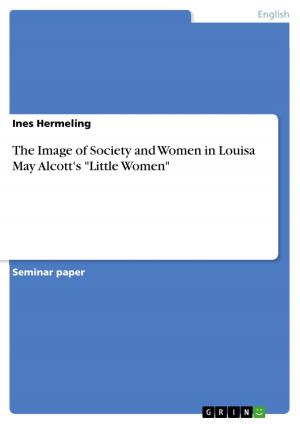The Sequence of Generations in Philip Roth's American Pastoral
Nonfiction, Entertainment, Drama, Anthologies| Author: | Anke Balduf | ISBN: | 9783638175074 |
| Publisher: | GRIN Publishing | Publication: | March 6, 2003 |
| Imprint: | GRIN Publishing | Language: | English |
| Author: | Anke Balduf |
| ISBN: | 9783638175074 |
| Publisher: | GRIN Publishing |
| Publication: | March 6, 2003 |
| Imprint: | GRIN Publishing |
| Language: | English |
Seminar paper from the year 2000 in the subject American Studies - Literature, grade: 2,0 (B), University of Heidelberg (Anglistics Seminar), course: Hauptseminar Contemprary American Novels, 11 entries in the bibliography, language: English, abstract: Much has been said about Philip Roth's American Pastoral in terms of general criticism. While some critics say it is a book about a writer, the famous novelist Nathan Zuckerman, who somehow comes to terms with the hero of his youth, Seymour 'The Swede' Levov, others say that it is 'a novel about three generations of family life and, in particular, the rupture between a father and a daughter that embodies the social upheaval of the 60's.' (1) So, who is right? All of them are. It just depends on one's point of view and one's focus. Nathan Zuckerman narrates the story of Seymour Levov, who 'is a consummate athlete, husband to Miss New Jersey and heir to a glove factory. [...] With his canny eye, Zuckerman gives us the Swede's rise and fall, from hale high school hero to bastion of mediocrity.' (2) Zuckerman's own story about his childhood in Newark and parts of his life lead to the Levov-story starting on page 89, which is when Zuckerman disappears and does not return as a character. He does come back, though, from time to time when his sarcasm gives him away while telling the story. His sarcastic, personal involvement would certainly be an interesting subject to talk about, along with other themes that run through the novel, e.g. the shifts in perspective, the different settings and their meaning, the question whether 'Swede Levov [is] a good innocent man who has the bad luck to become history's plaything' or whether there is 'something significantly wrong with [him]' (3), 'the trials of ethnic identity, the fate of Old World values transposed to the New World, the wrenching political confusion of recent American history.'(4) My focus will be on the three generations of the Levovs and their relationships towards each other. Lou, the Swede and Merry are 'people as different from one another as they could possibly be, but intimately intertwined.' (5) Critics have often said that 'family' is a major theme in all of Roth's works, and American Pastoral is no different. In this novel, too, Roth views 'family relationships as extremely problematic and essentially frustrating but acknowledge[s] their importance in human affairs.' The problems between parents and children, again, are caused by the lost viability of 'traditional ideas of family solidarity and reinforcement of personal identity through strong familial bonds.' [...]
Seminar paper from the year 2000 in the subject American Studies - Literature, grade: 2,0 (B), University of Heidelberg (Anglistics Seminar), course: Hauptseminar Contemprary American Novels, 11 entries in the bibliography, language: English, abstract: Much has been said about Philip Roth's American Pastoral in terms of general criticism. While some critics say it is a book about a writer, the famous novelist Nathan Zuckerman, who somehow comes to terms with the hero of his youth, Seymour 'The Swede' Levov, others say that it is 'a novel about three generations of family life and, in particular, the rupture between a father and a daughter that embodies the social upheaval of the 60's.' (1) So, who is right? All of them are. It just depends on one's point of view and one's focus. Nathan Zuckerman narrates the story of Seymour Levov, who 'is a consummate athlete, husband to Miss New Jersey and heir to a glove factory. [...] With his canny eye, Zuckerman gives us the Swede's rise and fall, from hale high school hero to bastion of mediocrity.' (2) Zuckerman's own story about his childhood in Newark and parts of his life lead to the Levov-story starting on page 89, which is when Zuckerman disappears and does not return as a character. He does come back, though, from time to time when his sarcasm gives him away while telling the story. His sarcastic, personal involvement would certainly be an interesting subject to talk about, along with other themes that run through the novel, e.g. the shifts in perspective, the different settings and their meaning, the question whether 'Swede Levov [is] a good innocent man who has the bad luck to become history's plaything' or whether there is 'something significantly wrong with [him]' (3), 'the trials of ethnic identity, the fate of Old World values transposed to the New World, the wrenching political confusion of recent American history.'(4) My focus will be on the three generations of the Levovs and their relationships towards each other. Lou, the Swede and Merry are 'people as different from one another as they could possibly be, but intimately intertwined.' (5) Critics have often said that 'family' is a major theme in all of Roth's works, and American Pastoral is no different. In this novel, too, Roth views 'family relationships as extremely problematic and essentially frustrating but acknowledge[s] their importance in human affairs.' The problems between parents and children, again, are caused by the lost viability of 'traditional ideas of family solidarity and reinforcement of personal identity through strong familial bonds.' [...]















